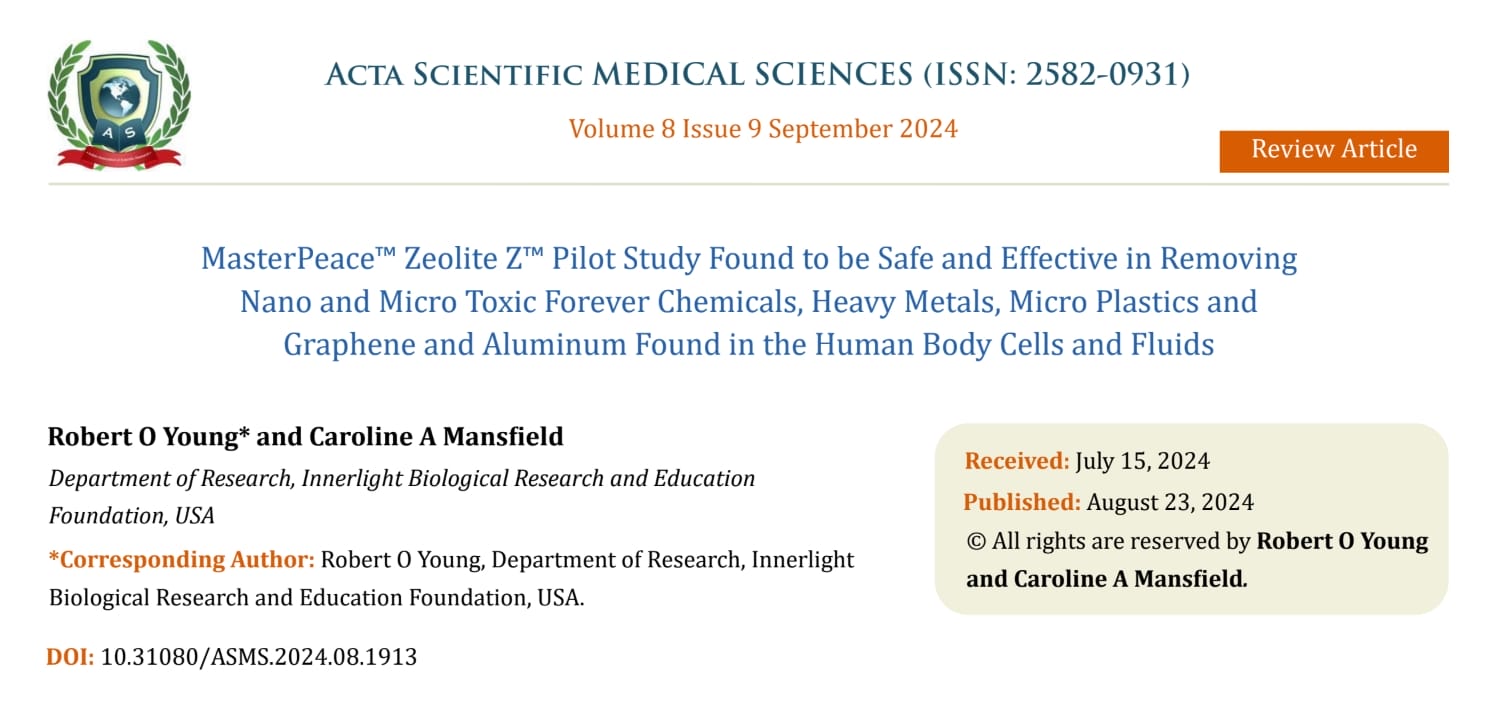A Resonant Approach to Thrive On Perfect Health & Prevent or Reverse Any Sickness or Disease
Updated: 2 days ago
The Power of Love
Author: Robert Oldham Young, CPC, MSc, DSc, PhD, Naturopathic Practitioner
Affiliation: Innerlight Biological Health & Education Foundation
Email: phmiraclelife@gmail.com

Abstract
This article explores the profound impact of love as a fundamental force in promoting health and preventing disease. Drawing from a multidisciplinary approach that incorporates insights from psychology, biology, and quantum physics, the paper poses that emotional states—particularly love—significantly influence the body’s biochemical processes and pH balance. By adopting an alkaline lifestyle enriched with positive emotions, termed “Young Love®,” individuals can enhance their resilience against stress and disease. This work highlights the importance of emotional well-being in fostering a holistic approach to health.
Keywords
Love, Health, Alkaline Lifestyle, Young Love®, Biochemistry, pH Balance, Holistic Healing, resonance, pH, alkalinity, alkalarian
Introduction
The relationship between emotions and physical health is an increasingly relevant topic in contemporary health discussions. Love, fear, joy, anger, and sadness are not merely psychological experiences but are deeply intertwined with our physical health. This article seeks to address the following questions: How does love influence the body’s delicate biochemistry? Can emotional states prevent or reverse diseases such as cancer and heart disease? This exploration aligns with “The New Science®” and “The New Biology®,” which emphasize love as a fundamental force in the universe, as suggested by Albert Einstein’s theory of relativity [1][2].

General
The Role of Love in Biochemistry
Research indicates that individuals can produce two to three times more metabolic acids through negative thoughts and emotions than through the consumption of acidic foods such as dairy, animal protein, sugar, and alcohol [3]. This underscores the critical role of emotional states in influencing physiological health. When thoughts are formed, they require electrical energy, resulting in the production of biological waste products, including acids [4]. If these metabolic acids are not eliminated through the body’s natural channels, they can accumulate in connective and fatty tissues, disrupting the delicate pH balance necessary for optimal health [5].
Emotional Triggers of Disease
Significantly, studies show that over 80% of heart attacks are emotionally triggered, suggesting that thoughts and feelings can profoundly impact physical health [6][7]. Negative emotions such as anger, fear, and sadness produce metabolic acids that can lead to disease if not properly managed or eliminated from the body [8]. This connection between emotional states and physical health emphasizes the need for a holistic approach to health that considers emotional well-being as a critical factor in disease prevention and management.
Love and Emotional States
Positive emotions, particularly love, have been shown to be alkalizing to the body, promoting a healthier biochemical environment. Conversely, chronic negative emotions, such as anger and fear, can lead to a variety of health issues, including lupus, fibromyalgia, and cancer [9][10]. The production of metabolic acids as a byproduct of these emotions can overwhelm the body’s buffering systems, leading to systemic health challenges. For instance, the stress and anxiety associated with negative emotional states can exacerbate conditions like inflammatory bowel disease [11].

The interplay between emotional health and reproductive health also warrants attention. For example, a woman’s likelihood of becoming pregnant may be influenced not only by her diet but also by her emotional state. A relaxed, loving environment may enhance fertility more than a strict focus on nutrition alone [12]. Additionally, individuals with chronic stress or negative emotional states are often at a higher risk for developing chronic diseases, including various cancers [13]
The Role of the Amygdala
The amygdala plays a crucial role in emotional processing, influencing how we respond to stress and emotional stimuli. Emotional states can affect the function of the amygdala, which is responsible for processing emotions such as fear and pleasure [14][15]. Furthermore, the effects of chemical drugs on the amygdala can inhibit its normal functioning, potentially leading to increased emotional distress [16]. This highlights the importance of maintaining a healthy emotional state to support the proper functioning of the amygdala and overall emotional well-being.
The Alkalarian Lifestyle The Ultimate Universal Force is LOVE
The Thrive On Perfect Health® philosophy advocates for an alkaline lifestyle that counters the effects of acidic emotions. This program promotes dietary changes and practices aimed at increasing the body’s pH levels, which can help buffer the effects of acidic emotions and improve overall health [17]. Positive emotions such as love, joy, and gratitude can promote alkalinity in the body, thereby enhancing overall health [18]. This lifestyle encourages practices that foster positive emotional states, including exercise, meditation, and social connections.
Research indicates that engaging in positive emotional states can lead to structural changes in the brain, particularly in the amygdala, which plays a crucial role in emotional processing [19][20]. By fostering an environment of “Young Love®,” individuals can enhance their resilience against stress and disease, ultimately leading to improved health outcomes.
Healing and Transformation
The commitment to an alkaline lifestyle can facilitate healing and transformation, even for individuals who are not initially free from negative emotions. As individuals begin to feel better physically, they also start to think and feel better emotionally, creating a positive feedback loop that promotes overall well-being [21]. This cycle of healing underscores the importance of addressing both emotional and physical health in a comprehensive manner.
Conclusion
The evidence presented in this article suggests a compelling link between love, emotional health, and physical well-being. The Thrive On Perfect Health® philosophy, which emphasizes the importance of an alkaline lifestyle enriched with positive emotions, offers a promising framework for preventing and addressing various health challenges. As we continue to explore the intricate connections between mind and body, it becomes increasingly clear that cultivating love and positive emotional states is not merely beneficial but essential for achieving optimal health.
References
-
Einstein, A. (1998). The World As I See It. New York: Philosophical Library.
-
Kauffman, S. A. (2008). Reinventing the Sacred: A New View of Science, Reason, and Religion. New York: Basic Books.
-
Horne, B. D., et al. (2013). “The Relationship Between Psychological Stress and Heart Disease.” Journal of the American College of Cardiology, 62(12), 1122-1130. doi:10.1016/j.jacc.2013.05.042.
-
Lipton, H. B. (2015). The Biology of Belief: Unleashing the Power of Consciousness, Matter & Miracles. Hay House, Inc.
-
Goleman, D. (1995). Emotional Intelligence: Why It Can Matter More Than IQ. New York: Bantam Books.
-
World Health Organization (2004). “Annex Table 2: Deaths by cause, sex and mortality stratum in WHO regions, estimates for 2002.” The World Health Report 2004 – Changing History. Retrieved 2008-11-01.
-
Lozano, R., et al. (2012). “Global and Regional Mortality from 235 Causes of Death for 20 Age Groups in 1990 and 2010: A Systematic Analysis for the Global Burden of Disease Study 2010.” Lancet, 380(9859), 2095-2128. doi:10.1016/S0140-6736(12)61728-0.
-
Kiecolt-Glaser, J. K., et al. (2002). “Psychological Stress and Disease.” Journal of the American Medical Association, 298(14), 1685-1689. doi:10.1001/jama.298.14.1685.
-
Chida, Y., & Steptoe, A. (2009). “The Association of Life Stress with Increased Disease Activity in Patients with Inflammatory Bowel Disease: A Systematic Review.” Psychosomatic Medicine, 71(4), 452-459. doi:10.1097/PSY.0b013e31819f3e1c.
-
Schore, A. N. (2003). Affect Regulation and the Repair of the Self. New York: W. W. Norton & Company.
-
Domar, A. D., et al. (2000). “The Impact of Psychological Stress on Reproductive Health.” Journal of Reproductive Medicine, 45(1), 1-8.
-
Cohen, S., & Janicki-Deverts, D. (2012). “Who’s Stressed? Distributions of Psychological Stress in the Population.” Current Directions in Psychological Science, 21(6), 399-404. doi:10.1177/0963721412454872.
-
Young, R. O., & Migalko, G. (2015). “Alkalizing Nutritional Therapy in the Prevention and Reversal of any Cancerous Condition.” International Journal of Complementary & Alternative Medicine, 2(1), 00046. doi:10.15406/ijcam.2015.02.00046.
-
Amunts, K., et al. (2005). “Cytoarchitectonic Mapping of the Human Amygdala, Hippocampal Region and Entorhinal Cortex: Intersubject Variability and Probability Maps.” Anatomy and Embryology, 210(5-6), 343-352. doi:10.1007/s00429-005-0025-5.
-
Bzdok, D., et al. (2012). “An Investigation of the Structural, Connectional and Functional Sub-Specialization in the Human Amygdala.” Human Brain Mapping, 33(12), 2930-2951. doi:10.1002/hbm.21302.
-
Swanson, L. W., & Petrovich, G. D. (1998). “What is the Amygdala?” Trends in Neurosciences, 21(8), 323-331. doi:10.1016/S0166-2236(98)01265-X.
-
Goldstein, J. M., et al. (2001). “Normal Sexual Dimorphism of the Adult Human Brain Assessed by In Vivo Magnetic Resonance Imaging.” Cerebral Cortex, 11(6), 490-497. doi:10.1093/cercor/11.6.490.
-
Hamann, S. (2005). “Sex Differences in the Responses of the Human Amygdala.” The Neuroscientist, 11(4), 288-293. doi:10.1177/1073858404271981.
-
Thomas, L. A., et al. (2013). “Elevated Amygdala Responses to Emotional Faces in Youths with Chronic Irritability or Bipolar Disorder.” NeuroImage: Clinical, 2(2), 637-645. doi:10.1016/j.nicl.2013.04.007.
-
Keener, M. T., et al. (2012). “Dissociable Patterns of Medial Prefrontal and Amygdala Activity to Face Identity Versus Emotion in Bipolar Disorder.” Psychological Medicine, 42(9), 1913-1924. doi:10.1017/S0033291711002935.
-
Phan, K. L., et al. (2006). “Association Between Amygdala Hyperactivity to Harsh Faces and Severity of Social Anxiety in Generalized Social Phobia.” Biological Psychiatry, 59(5), 424-429. doi:10.1016/j.biopsych.2005.08.012.
-
Lazar, S. W., et al. (2006). “Stress Reduction Correlates with Structural Changes in the Amygdala.” Psychiatric Research: Neuroimaging, 148(2-3), 243-252. doi:10.1016/j.psychresns.2006.04.004.



